“Songs of Innocence” is an album which revolves around a feeling of nostalgia for lost innocence, taking us back to the days in which this Irish band was yet to become the most famous rock band in the world.
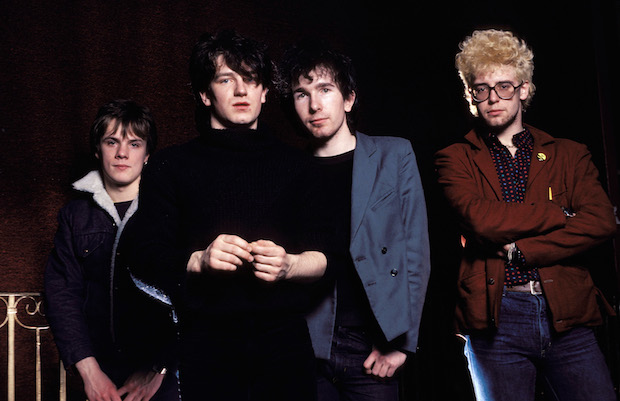 In their latest album, U2 goes back to the days of their first band, The Hype, in Dublin.
In their latest album, U2 goes back to the days of their first band, The Hype, in Dublin.
When you reach a certain age, you tend to take a look back, trying to work out who you really are. This is what U2 are doing in their latest album, “Songs of Innocence”, which revolves around a feeling of nostalgia for lost innocence. It takes us back to the days in which this Irish band was yet to become the most famous rock band in the world and was still just the group of teenagers who made up The Hype at their Protestant school in Dublin, Mount Temple. This happened during the era of punk, which gave Bono and Larry an outlet for the anger they felt at the tragic loss of their mothers when they were still just teenagers.
Forty years after his mother collapsed from a brain aneurysm at her father's funeral in 1974, Bono still has that same feeling of loss which filled the songs of his first album, “Boy” (1980). It was during the following summer that I saw U2 at the Christian festival, Greenbelt. Three of them were part of a non-denominational charismatic evangelical community called Shalom. They played unannounced, borrowing equipment and instruments, after calling the festival because they believed that God had told them to go and play there.
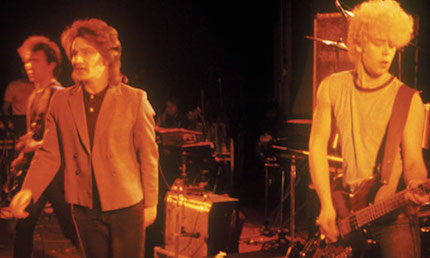 U2 in the Greenbelt Christain festival in 1981.
U2 in the Greenbelt Christain festival in 1981.Bono was already a consummate showman and he knew how to dominate the stage. At the end, they sang two songs from their upcoming album, “October” (1981), ending with “With A Shout (Jerusalem)”:
Where do we go from here?
To the side of a hill
Blood was spilt
Jerusalem
Shout, with a shout, shout it out
I want to go to the foot of Mount Zion
To the foot of He who made me see
To the side of the hill blood was spilt
We were filled with a love
And we're going to be there again.
AN ADOLESCENT FAITH
The front cover of those two albums showed a boy called Peter Rowen, who is now a photographer. He was the son of a family belonging to a Brethren assembly and who lived in a house in Bono's neighbourhood, where he would join them for bible studies. Bono has always been very close to the elder brother, Guggi, who was in a band called Virgin Prunes. Together they were part of a street gang called Lypton Village.
The new U2 album again has a picture of a boy on the front cover. He is the son of the drummer, Larry Mullen. He looks like an adolescent but he is, in fact, already eighteen. He is named after his father's idol, Elvis.
Larry was the first to leave the Shalom community, which he compared to a Moonie-like sect. Bono followed him but the guitarist, The Edge, was on the point of leaving U2 because of a prophecy that a woman in the community had, saying that they had turned their music into an idol and that they had to choose whom to follow.
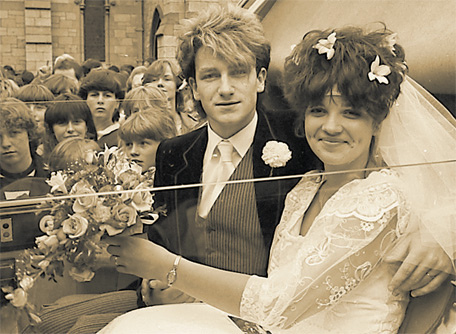 Bono married the girlfriend of his adolescence.
Bono married the girlfriend of his adolescence.Bono convinced The Edge to stay in the band, arguing that if God had given them a gift, they should use it. Their lack of commitment in the community coincided with a turning point in the charismatic movement, which became even more controlling as of the 1980s. The pastor followed Watchman Nee's ideas on spiritual authority, according to which not following the guidance of the community leaders was a rebellion against God's will. That was what led Larry to compare Shalom to the Moonies.
CHASING DOWN A DREAM
“I woke up at the moment when the miracle occurred; heard a song that made some sense out of the world” Bono remembers in the first song on the album, “The Miracle”. The direct and simple rock of the Ramones spoke to the adolescent dreams and frustrations of the three members of U2 who went to the concert of these New York “brothers”, held at a cinema in Dublin in 1978. In fact, for their first television appearance, U2 sang a cover of a song by the Ramones, which the producer thought they had written themselves.
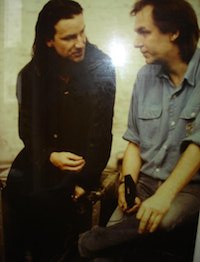 Bono and Steve Turner in 1988.
Bono and Steve Turner in 1988.Punk emerged in England in the middle of the 70s as an act of rebellion, carrying a strong nihilist message in reaction to hippy idealism. Its real origins, though, were in the nightmare of drugs and violence which unfurled upon New York City at the start of that decade on discovering that “the dream is over”. On discovering punk during one of our summers in London, I wrote an article about it in my school magazine. At that time, the Ramones were iconic figures of the “Movida Madrileña”, a countercultural movement which took place in Spain in the aftermath of the Transition period following Franco's death.
Although punk was born in New York, it was in the UK that it became a movement. It is that activism that the song “This is where you can reach me now” is talking about. It was the thing that not only got U2 excited at the concert of The Clash at Trinity College Dublin, but which also captivated those who went to the North-American tour of Joe Strummer’s band in 1979 – rock lovers like the author of the screenplay of Martin Scorsese’s “Taxi Driver”, Paul Schrader, who recently wrote that it was the best concert that he has ever been to. I still remember how I felt when I first listened to the album “London calling”, which I bought when in London that same Christmas.
¿FAITH OR RELIGION?
What is surprising is that Bono managed to bring together the rage fuelling punk and the compassion of Christ. He had the courage of biblical prophetic denunciation, alongside a glorious vision of a future of Christian hope.
To this day, I still haven't heard a modern song of praise with the strength of “Gloria” – the first song on their album “October” –, which combines a confession of human powerlessness with a declaration of divine exaltation – "Gloria in te domine, exultate"–.
This was not only incredible in a society like Ireland's, where there was nothing like the contemporary Christian music found in England or in the United States, but where religion was linked to the context of violence which comes out in “Raised by Wolves”.
Bono does not see his faith in terms of the religion which has divided his country. That is why he does not proclaim himself either Catholic or Protestant – his father was Catholic and his mother Anglican, which is the church he went to as a child–. According to him, religion is what happens “When God [like Elvis] has left the building; a list of instructions where there was once conviction”.
In May 1974 a bomb was set off in Dublin on Talbot Street, where Bono used to go to buy music. That day, though, he went home on his bike, while Unionist terrorists murdered 34 people. One of Guggy and Peter's brothers, Andy Rowen, got locked into his father’s van and was so affected by the explosion that he gave up his training in a brethren assembly, entering a spiral of heroine, which inspired the character in “Bad” (1984) – the song which U2 sang at the Live Aid festival–. He has now come out of rehabilitation.
U2 confronts the nationalism which condoned that kind of violence, as well a religion which has abused children in their country. They dedicate the song “Sleep like a baby tonight” to one of the victims. It starts off like a synthesized lullaby in Kraftwerk style, turning into a strong denunciation of the silence of a church which is insensitive to the pain of others. “Hope is where the door is”, allowing us to escape from that abusive religion, “where there's no daylight, there's no healing”.
UNFORGETTABLE FIRE
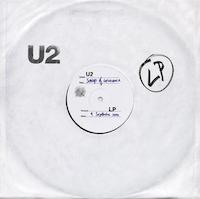 'Songs of innocence' is the closest to a conceptual album.
'Songs of innocence' is the closest to a conceptual album. As for so many other Irish people, the United States is not just the reason for U2's success, but an oasis of freedom which took these young men out of their dark and oppressive Ireland to discover the light of California, the subject of their song by the same name. The American experience, however, did not make them forget their friends from their teenage years. The album contains songs dedicated to Guggy and to Gavin Friday of the Virgin Prunes, who lived near Bono’s house on Cedarwood Road, which is the title of another song.
There is, of course, an invocation to Bono's patient/long-suffering wife, Ali, in “Song for someone”. They met at school and got married in the Church of Ireland – the Irish Anglican church–, in a ceremony led by one of his teachers, Jack Heaslip– who went on to become a reverend–, and at which the pastor of Shalom, Chris Rowe, preached.
Heaslip continues to be one of Bono’s spiritual counsellors, together with the evangelical writer Steve Turner, who wrote the book of the film “Rattle and Hum” and who has given Bono a number of books over the years.
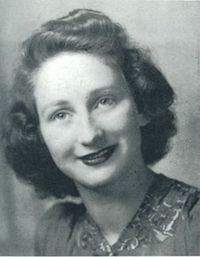 Bono's mother died when he was 14 years old.
Bono's mother died when he was 14 years old.The song I find most moving is dedicated to Bono’s mother, “Iris”, who died when he was only fourteen years old. As someone who also lost his mother at an early age, the words cut even deeper than his songs to her in the album “Zooropa” (1993), “Lemon” or in “Pop” (1997), “Mofo”. In that last song, he said that his mother had left him, had made him someone; he now declares that the light of her star lives on in him.
His mother, who would take him and his brother to the Church of Ireland chapel every Sunday– while his father would go to mass at the Catholic Church in the district of Finglas, north Dublin–, planted the seed of faith which came to fruition during Bono’s adolescence.
That “sincere faith” which Paul said was in Timothy, having first lived in his grandmother and then in his mother (2 Timothy 1:5), started a “flame” which must be “fanned” (v. 6). This is the “gift of God” which Bono has received, and which I hope will produce an “unforgettable fire”.
“And I’m a long, long way from your Hill of Calvary
And I’m a long way from where I was and where I need to be
If there is a light you can’t always see
....don’t let it go out”

Las opiniones vertidas por nuestros colaboradores se realizan a nivel personal, pudiendo coincidir o no con la postura de la dirección de Protestante Digital.
Si quieres comentar o